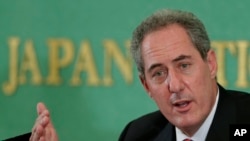The United States and Japan are holding a round of talks to resolve significant differences over a wide-ranging, Asia-Pacific free trade deal.
U.S. Trade Representative Michael Froman is meeting in Tokyo on Wednesday with Japanese economy minister Akira Amari.
Before the talks, Froman acknowledged that there is "a lot of work to do."
"I'm looking forward to I hope a productive set of discussions today with Minister Amari. We have a lot of work to do, and I think there is good will on both side, and we can make progress toward bridging our outstanding differences," said Froman.
Talks earlier in the week appeared to break down, with Japanese officials reporting little progress in narrowing gaps.
Washington is urging Japan to further open up key agricultural markets, which have historically been protected by Tokyo.
Both sides hope to reach a deal by the time President Barack Obama visits Japan in late April.
Japanese Deputy Chief Cabinet Secretary Hiroshige Seko denied that the visit represents a hard deadline.
"We consider President Obama's visit to Japan as an important juncture but not a deadline. We're not considering a specific deadline for our negotiations as the most important task to us is to promote our national interest," said Seko.
The U.S.-Japan disagreements have played a key role in slowing talks on the U.S.-led Trans-Pacific Partnership (TPP), which involves 12 nations.
The TPP talks have already extended past a 2013 deadline, and it is unclear if a consensus will be reached any time soon.
U.S. Trade Representative Michael Froman is meeting in Tokyo on Wednesday with Japanese economy minister Akira Amari.
Before the talks, Froman acknowledged that there is "a lot of work to do."
"I'm looking forward to I hope a productive set of discussions today with Minister Amari. We have a lot of work to do, and I think there is good will on both side, and we can make progress toward bridging our outstanding differences," said Froman.
Talks earlier in the week appeared to break down, with Japanese officials reporting little progress in narrowing gaps.
Washington is urging Japan to further open up key agricultural markets, which have historically been protected by Tokyo.
Both sides hope to reach a deal by the time President Barack Obama visits Japan in late April.
Japanese Deputy Chief Cabinet Secretary Hiroshige Seko denied that the visit represents a hard deadline.
"We consider President Obama's visit to Japan as an important juncture but not a deadline. We're not considering a specific deadline for our negotiations as the most important task to us is to promote our national interest," said Seko.
The U.S.-Japan disagreements have played a key role in slowing talks on the U.S.-led Trans-Pacific Partnership (TPP), which involves 12 nations.
The TPP talks have already extended past a 2013 deadline, and it is unclear if a consensus will be reached any time soon.





